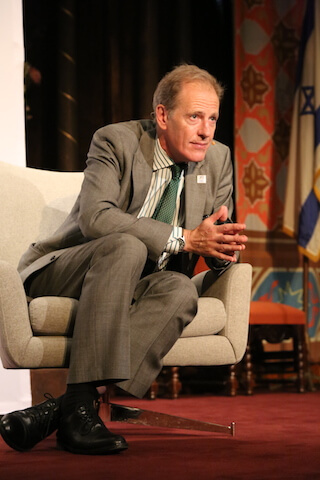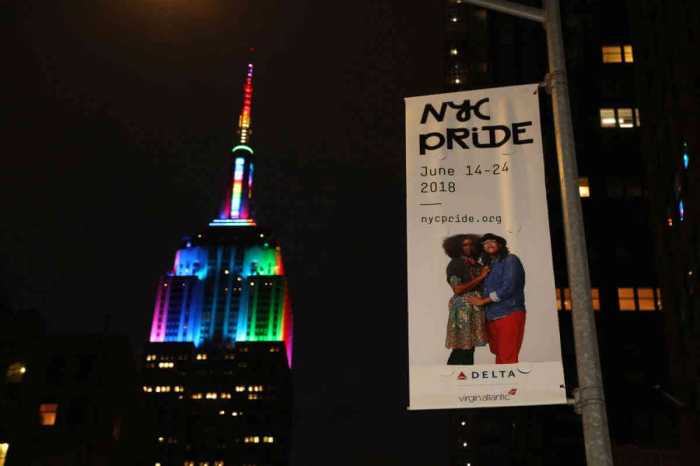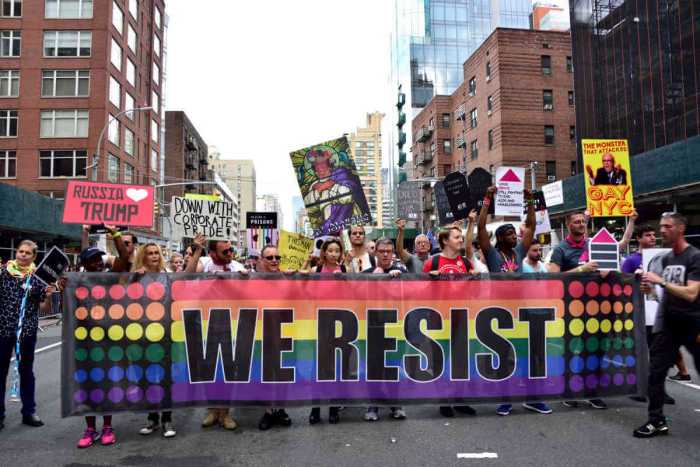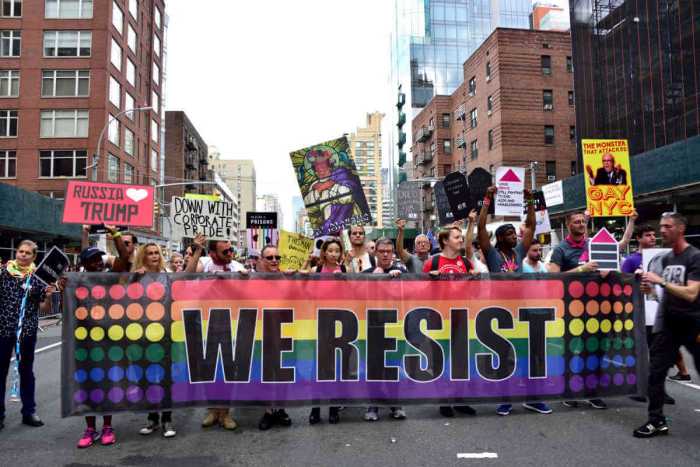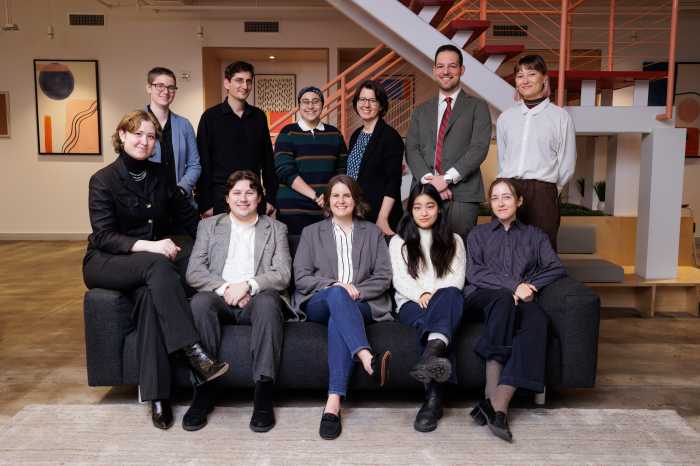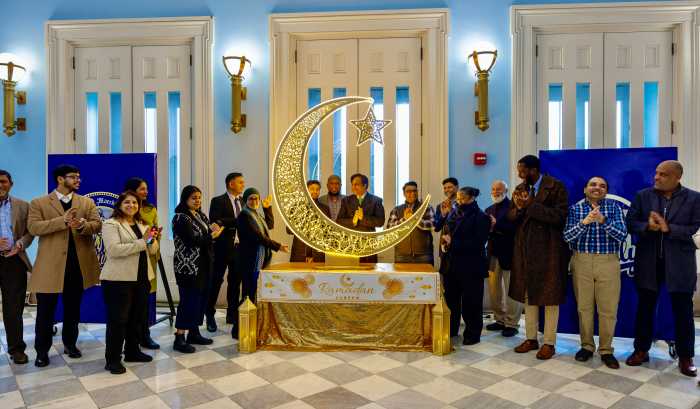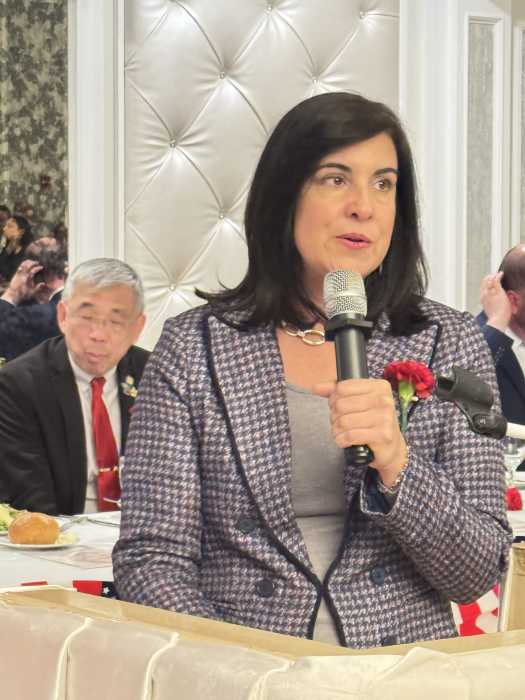Jessica Stern, executive director of OutRight Action International, and Fabrice Houdart from the UN Office of the High Commissioner on Human Rights at a panel on the role of the private sector in advancing the global rights agenda. | MICHAEL LUONGO
Heritage of Pride, the organization behind New York’s annual LGBTQ Pride Parade, hosted its first ever human rights conference on June 14. According to Eboni Munn, HOP’s communications manager, somewhere between 250 and 300 people participated in the daylong conference. Munn and others with HOP said the event was in some respects a trial run for next year’s 50th anniversary of the Stonewall riots, when New York will host World Pride which always includes a multi-day human rights conference.
The conference was held at the State University of New York Global Center on East 55th Street and ended with a ceremony as the nearby Central Synagogue with a spoken word presentation by poet Timothy DuWhite and a conversation between LGBTQ activist and political commentator Aisha C. Moodie-Mills and the Union Nations Assistant Secretary-General for Human Rights Andrew Gilmour, who works at the Office of the High Commissioner on Human Rights.
A broad range of panels examined topics including LGBTQ military issues, moderated by West Point graduate Sue Fulton, who fought for an end to the Don’t Ask, Don’t Tell policy and now heads the New Jersey Motor Vehicle Commission; LGBTQ elders, presented by SAGE, Services and Advocacy for GLBT Elders; health issues, presented by Gay Men’s Health Crisis, and LGBTQ immigration and asylum policy and activism.
June 14 event is prelude to next year’s celebration of World Pride, Stonewall 50
One well attended afternoon panel was entitled “Global Human Rights of LGBTI People and the Role of the Private Sector,” presented by the Office of the United Nations High Commissioner for Human Rights and moderated by Fabrice Houdart, a human rights officer with the UNHCHR who works on LGBTQ issues worldwide.
Poet Timothy DuWhite presented a spoken word performance at Midtown’s Central Synagogue. | MICHAEL LUONGO
Mark Lane, director of corporate communications for Barclays, observed that many employees who join LGBTQ corporate groups might be full-time activists were they not in the corporate sector.
“I choose to do my activism internally and make sure that Barclays uses the platform and rank that it has to create change in the UK,” Lane said. “We sponsor something like 20 Pride celebrations across the UK.”
He offered the example of the Staley brothers — HIV activist Peter and his brother, Jes, Barclays’ CEO, who often work together on projects of importance to the queer community.
Jessica Stern, executive director of OutrRght Action International, a group focused on global LGBTQ issues, was on the panel and cautioned that while corporate sponsorship is important, the total dollar numbers is actually very small, with companies often spending more on promoting their LGBTQ work from a public relations standpoint than on the actual work. She added that companies often focus on issues seen as “politically palatable.”
Stern urged those in attendance to think about “issues that are more controversial as well as work on true empowerment, on liberation, work on those members of our community that are most marginalized. That includes LGBTQI people of color and those targeted on the basis of gender non-conformity. As a community, if we don’t have diverse sources of funding, we are going to see more and more resources going into our community in a charity model and not in an empowerment model.”
Stern’s comments resonated with Samy Nemir Olivares, founder of Latinx for Equality in America, also known as Queermisú. After the panel, he told Gay City News, “I came to this event because there is a lack of representation of Latinos and people of color in human rights spaces, particularly LGBTQ, and I wanted to learn more about the work that the international organizations are doing and how can we elevate the work that Latinos are doing across the United States in topics like immigration, representation in media, and also leadership, as well as HIV. So, I think we have a lot to do to make sure that Latinos are represented in the work of LGBTQ organizations.”
During his conference closing talk, the UN’s Gilmour spoke on a variety of human rights issues beyond LGBTQ topics, ranging from Gaza to the separation of children from immigrants at the US border, which he described as “despicable.”
The UN Assistant Secretary-General for Human Rights Andrew Gilmour at a closing conversation at the Central Synagogue. | MICHAEL LUONGO
When asked about the increasing potency of nationalism worldwide and its impact on human rights, Gilmour said, “We are talking about places in Europe, Western Europe and Eastern Europe, and the United States. Now these countries are traditionally and claim to be attendant to human rights,” but are currently looking for scapegoats and blaming immigrants and other marginalized communities for their problems.
“The fact that Europe and the United States are seen as stepping back and being less vocal on rights, emboldens those countries — I am talking about Russia, China, in the UN, and many others — who are actually failing on human rights [and they] can point to the West and the hypocrisy of the West, saying, ‘They do it as well.’”
Despite the apparent backsliding across a spectrum of human rights issues, Gilmour said, “What I am hoping for comes out of this bad moment when it comes to human rights at a government level is that citizens will do more.”
He said he would like to see more cooperation among LGBTQ, women’s, and other human rights groups.
“We have to have far more alliances, so people don’t just stand up and say I am going to be an LGBT activist, I am going to be a women’s activist, I am going to be a Black Lives Matter activist,” Gilmour said. “They are all under threat, but they are not going to prevail if they just stay in their silos and don’t cross-fertilize and come together.”
The UN Assistant Secretary-General for Human Rights Andrew Gilmour at a closing conversation at the Central Synagogue. | MICHAEL LUONGO

